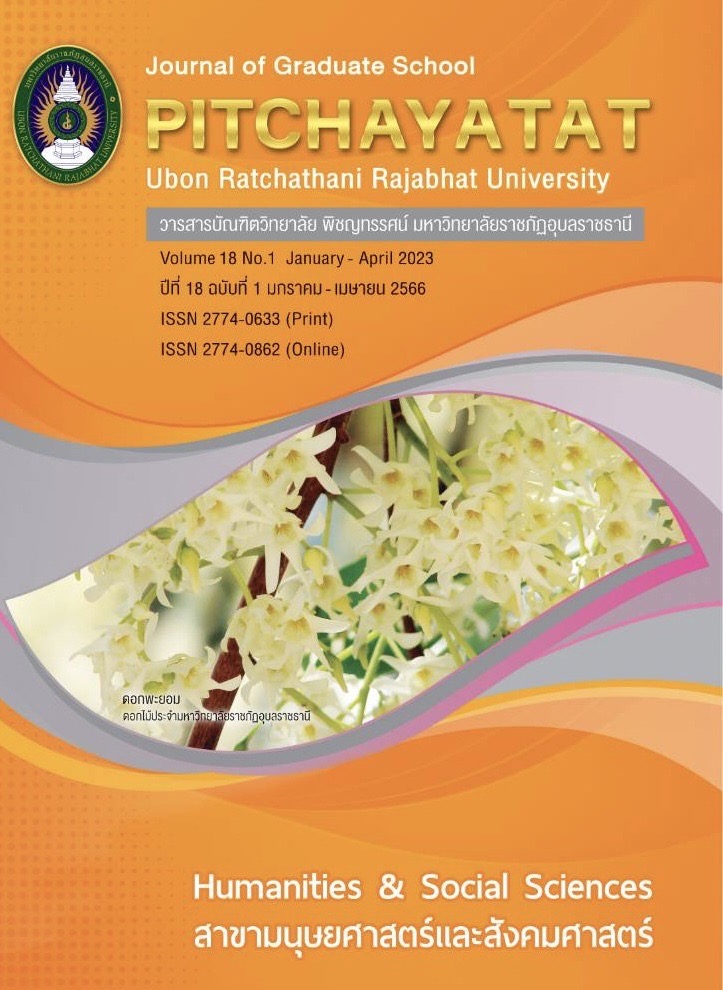สภาพ ความต้องการจำเป็นและแนวทางพัฒนาทักษะผู้นำแห่งศตวรรษที่ 21 ของผู้บริหารสถานศึกษา สำนักงานเขตพื้นที่การศึกษามัธยมศึกษามุกดาหาร
คำสำคัญ:
ความต้องการจำเป็น , ทักษะของผู้นำแห่งศตวรรษที่ 21 ของผู้บริหารสถานศึกษา , แนวทางพัฒนาบทคัดย่อ
งานวิจัยนี้มีวัตถุประสงค์เพื่อ 1) ศึกษาสภาพปัจจุบัน และสภาพที่พึงประสงค์ 2) ประเมินความต้องการจำเป็น และ 3) พัฒนาแนวทางพัฒนาทักษะผู้นำแห่งศตวรรษที่ 21 ของผู้บริหารสถานศึกษา ตัวอย่างคือผู้บริหารสถานศึกษาและครู จำนวน 274 คน กำหนดขนาดตัวอย่างโดยเทียบตารางของ Krejcie and Morgan ได้มาโดยการสุ่มแบบแบ่งชั้น เครื่องมือที่ใช้ มีจำนวน 4 ฉบับ คือ (1) แบบสอบถามสภาพปัจจุบัน มีค่าดัชนีความสอดคล้องระหว่าง 0.80-1.00 ค่าอำนาจจำแนกรายข้อระหว่าง 0.24-0.76 และค่าความเชื่อมั่นทั้งฉบับเท่ากับ 0.91 (2) แบบสอบถามสภาพที่พึงประสงค์ มีค่าดัชนีความสอดคล้องระหว่าง 0.80-1.00 ค่าอำนาจจำแนกรายข้อระหว่าง 0.28-0.80 และค่าความเชื่อมั่นทั้งฉบับเท่ากับ 0.91 (3) แบบสัมภาษณ์แบบมีโครงสร้างมีค่าดัชนีความสอดคล้องเท่ากับ 1.00 ทุกข้อ และ (4) แบบประเมินความเหมาะสมและความเป็นไปได้ มีค่าดัชนีความสอดคล้องเท่ากับ 1.00 ทุกข้อ สถิติที่ใช้ ได้แก่ ร้อยละ ค่าเฉลี่ย ส่วนเบี่ยงเบนมาตรฐานและค่าดัชนีความต้องการจำเป็นแบบปรับปรุง (PNI Modified)
ผลการวิจัยพบว่า
- สภาพปัจจุบันทักษะผู้นำแห่งศตวรรษที่ 21 ของผู้บริหารสถานศึกษา โดยรวมอยู่ในระดับมาก ( x̅ =4.15) สภาพที่พึงประสงค์ทักษะผู้นำแห่งศตวรรษที่ 21 ของผู้บริหารสถานศึกษา โดยรวมอยู่ในระดับมากที่สุด ( x̅ = 4.54)
- ความต้องการจำเป็นที่มีค่าสูงสุด 3 อันดับแรก ได้แก่ ด้านทักษะการบริหารองค์กรแบบมุ่งผลสัมฤทธิ์ด้านทักษะการสื่อสาร และด้านทักษะเทคโนโลยีดิจิทัล
- แนวทางพัฒนาทักษะผู้นำแห่งศตวรรษที่ 21 ของผู้บริหารสถานศึกษา 1) ด้านทักษะการสื่อสาร ควรส่งเสริมการพัฒนาความรู้ สร้างเครือข่าย เริ่มบทสนทนาด้วยเรื่องทั่วไป เรียบเรียงประเด็นก่อนการสื่อสาร และควรสื่อสารให้เหมาะสมกับบริบทและสถานการณ์ 2) ด้านทักษะเทคโนโลยีดิจิทัล ควรจัดอบรมเกี่ยวกับเทคโนโลยี ส่งเสริมการใช้เทคโนโลยีดิจิทัล ฝึกฝนการใช้เทคโนโลยีด้วยตนเอง ศึกษา พ.ร.บ.ว่าด้วยการกระทำความผิดเกี่ยวกับคอมพิวเตอร์ ควรพิมพ์งานเอกสารด้วยตนเอง และควรศึกษาวิธีใช้สื่อออนไลน์ในทางการศึกษา 3) ด้านทักษะการคิด ควรส่งเสริมให้เกิดสังคมแห่งปัญญา ส่งเสริมให้ครูวิเคราะห์ปัญหาเพื่อต่อยอดในการทำวิจัยในชั้นเรียน วิเคราะห์สภาพปัญหาและนำหลักการบริหารมาใช้ และควรสร้างบรรยากาศแห่งการทำงานที่ดีให้เกิดขึ้นในสถานศึกษา 4) ด้านทักษะการรู้เท่าทันโลก ควรศึกษาข่าวสารและกฎหมาย เสริมสร้างสถานศึกษาให้เป็นสังคมแห่งความหลากหลาย ยอมรับ เข้าใจในความแตกต่างระหว่างบุคคล ควรสร้างวิสัยทัศน์ร่วมกันในองค์กร และควรมีความรอบรู้ในด้านต่าง ๆ เพื่อนำมาใช้ในการบริหารสถานศึกษา 5) ด้านทักษะการบริหารองค์กรแบบมุ่งผลสัมฤทธิ์ ควรปรับการประเมินเน้นการประเมินเพื่อพัฒนาการเรียนรู้ บริหารจัดการและจัดโครงสร้างสถานศึกษาให้ชัดเจน กระจายความรับผิดชอบตามหลักธรรมาภิบาล กำหนดทิศทาง วางแผน ตั้งเป้าหมายร่วมกัน และควรรับฟังความคิดเห็นของผู้อื่น ผลการประเมินแนวทางพัฒนา โดยรวมพบว่ามีความเหมาะสมอยู่ในระดับมากที่สุด (x̅ = 4.61) และมีความเป็นไปได้อยู่ในระดับมากที่สุด ( x̅ = 4.52)
เอกสารอ้างอิง
เขตพื้นที่การศึกษามัธยมศึกษามุกดาหาร, สำนักงาน. แผนปฏิบัติราชการประจำปีการศึกษา 2564. มุกดาหาร: สำนักงานเขตพื้นที่การศึกษามัธยมศึกษามุกดาหาร, 2564.
เขตพื้นที่การศึกษามัธยมศึกษามุกดาหาร, สำนักงาน. สำนักงาน. แผนปฏิบัติราชการประจำปีการศึกษา 2565. มุกดาหาร: สำนักงานเขตพื้นที่การศึกษามัธยมศึกษามุกดาหาร, 2565.
เขตพื้นที่การศึกษามัธยมศึกษามุกดาหาร, สำนักงาน. แผนพัฒนาการศึกษา (พ.ศ. 2566-2570). มุกดาหาร: สำนักงานเขตพื้นที่การศึกษามัธยมศึกษามุกดาหาร, 2564.
ชุมพร ภามนตรี. คุณลักษณะของผู้บริหารสถานศึกษาในศตวรรษที่ 21 ตามการรับรู้และความคาดหวังของครู สังกัดสำนักงานเขตพื้นที่การศึกษามัธยมศึกษา เขต 27. วิทยานิพนธ์ครุศาสตรมหาบัณฑิต มหาวิทยาลัยราชภัฏร้อยเอ็ด, 2558.
ปวีณา ครุฑเผือก. “ทักษะภาวะผู้นำของผู้บริหารสถานศึกษาไทยในยุคศตวรรษที่ 21 กลุ่มโรงโรงเรียนเครือข่ายที่ 15 สังกัดกรุงเทพมหานคร,” ใน: วิถีใหม่ในสังคมที่เปลี่ยนแปลง. การประชุมวิชาการระดับชาติ มหาวิทยาลัยนอร์ทกรุงเทพ ประจำปี 2564; 26 มีนาคม 2564; ปทุมธานี. ปทุมธานี: มหาวิทยาลัยนอร์ท
กรุงเทพ วิทยาเขตรังสิต, 2564. หน้า 122-132.
ผ่องพรรณ พลราช และเกริกไกร แก้วล้วน. “ภาวะผู้นำของผู้บริหารสถานศึกษาในศตวรรษที่ 21 สังกัดสำนักงานเขตพื้นที่การศึกษามัธยมศึกษา เขต 29,” Journal of Ratchathani Innovative Social Sciences. 1, 1 (เมษายน-มิถุนายน 2560): 27-40.
เลขาธิการสภาการศึกษา, สำนักงาน. รายงานการวิจัยแนวทางการพัฒนาการศึกษาไทยกับการเตรียมความพร้อมศตวรรษที่ 21. กรุงเทพฯ: สำนักงานเลขาธิการสภาการศึกษา, 2557.
วิชุดา บุญทรัพย์. แนวทางการพัฒนาภาวะผู้นำในยุคศตวรรษที่ 21 ของผู้บริหารโรงเรียน ในสังกัดเทศบาลนครรังสิต ปทุมธานี. วิทยานิพนธ์ศึกษาศาสตรมหาบัณฑิต มหาวิทยาลัยรังสิต, 2564.
ศึกษาธิการ, กระทรวง. นโยบายและจุดเน้นของกระทรวงศึกษาธิการ ปีงบประมาณ พ.ศ. 2565. (ออนไลน์) 22 กุมภาพันธ์ 2565 (อ้างเมื่อ 24 กรกฎาคม 2565). จาก: https://www.moe.go.th/นโยบายและจุดเน้น-2565
Kurniady, D. A. et al. “Analysis of 21st-Century Leadership in Higher Education Management,” In: Enhancing educational administration: planning, policy, management & leadership innovation, toward professional administration in digital era. Proceedings of the 3rd International Conference on Research of Educational Administration and Management (ICREAM 2019); Indonesia: Universitas Pendidikan, 2019. pp. 109-115.
ดาวน์โหลด
เผยแพร่แล้ว
รูปแบบการอ้างอิง
ฉบับ
ประเภทบทความ
สัญญาอนุญาต
ลิขสิทธิ์ (c) 2023 วารสารบัณฑิตวิทยาลัย พิชญทรรศน์ มหาวิทยาลัยราชภัฏอุบลราชธานี

อนุญาตภายใต้เงื่อนไข Creative Commons Attribution-NonCommercial-NoDerivatives 4.0 International License.
บทความทุกเรื่องได้รับการตรวจความถูกต้องทางวิชาการโดยผู้ทรงคุณวุฒิภายนอกอย่างน้อย 3 คน ความคิดเห็นในวารสารพิชญทรรศน์เป็นความคิดเห็นของผู้นิพนธ์มิใช่ความคิดเห็นของผู้จัดทำ จึงมิใช่ความรับผิดชอบของวารสารพิชญทรรศน์ และบทความในวารสารพิชญทรรศน์สงวนสิทธิ์ตามกฎหมายไทย การจะนำไปเผยแพร่ต้องได้รับอนุญาตเป็นลายลักษณ์อักษรจากกองบรรณาธิการ





